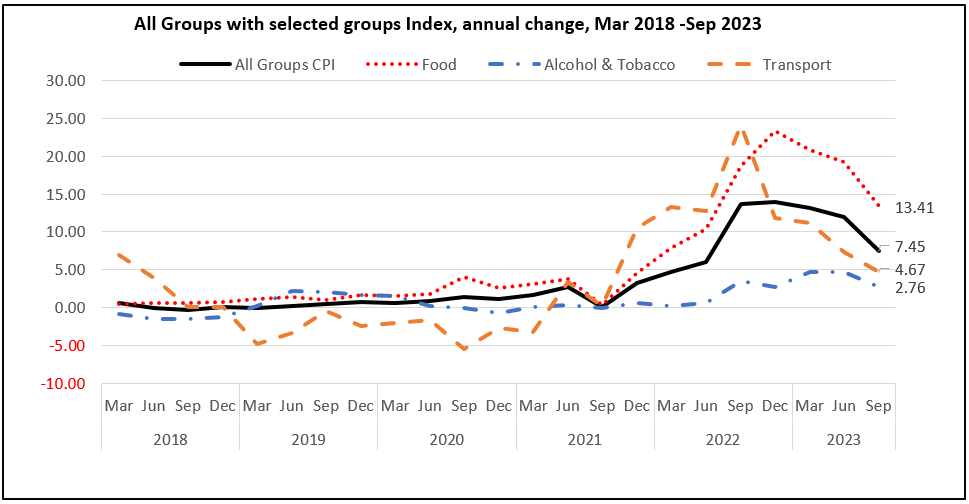Feeling the pinch at the checkout
Monday 29 January 2024 | Written by Al Williams | Published in Economy, National

Chair of Chamber of Commerce, Addrienne Hosking-Tinirau. SUPPLIED/ 23102515
Food and non-alcoholic beverages have weighed heavily in pushing up annual inflation.
Latest figures from the Cook Islands Statistics Office show the consumer price index (CPI) inflation rate was 7.4 percent between the September 2022 and 2023 quarters.
Across the 12 months to September 2023 it was noted the annual percentage contribution of food and non-alcoholic beverages was a significant 13.4 per cent.
The prices of various subgroups saw significant increases.
The cost of fish and seafood skyrocketed by 60 per cent, poultry, eggs and mineral water, soft drinks, fruit and vegetable juices increased by 15 per cent, oils and fats rose by 13 per cent, coffee, tea and cocoa by 12 per cent, vegetables by 11 per cent, Bread and cereals up by 9 per cent, meat increased by 7 per cent, sugar, jam, honey, chocolate and confectionery by 6 per cent, food products by 4 per cent, while the fruit group saw a slight decrease of 2 per cent.

The Consumer Price Index covers price changes of the basket of goods and services consumed by all households on Rarotonga (the main island). 24012420
Cook Islands Chamber of Commerce chairwoman Addrienne Hosking-Tinirau said multiple factors were influencing ongoing increases in the price of goods.
"While it is pleasing to see a reduction in the size of the increase of inflation, it is still nevertheless increasing.
“Some factors which have influenced the large annual increases in food and non-alcoholic beverages may not feature so highly going forward.”
Those included the cost increases due to the flooding in Hawkes Bay, the scarcity of fish locally, and the changes to New Zealand’s rules around the importation of only free-range eggs, Hosking-Tinirau said.
“However, oils, fats and flour may continue to rise due to international events such as the Ukraine war.
“Businesses have seen a significant increase in costs including insurance, wages, and the continued surcharge on electricity, and this is putting pressure on margins.
“The price of fuel and shipping costs into New Zealand are a big factor, given the disruptions to shipping in the MIddle East. It is good to see New Zealand's annual inflation continues to fall although still outside of the RBNZ's target, and we are hopeful we have seen the peak of inflation here as well.”
The transport group experienced an increase of 4.7 per cent across the 12 months. The main factor that contributed to the upward movement in the index for this group was mainly higher cost international airfares and cost of vehicles. Alcoholic beverages and tobacco contributed an increase of 2.8% to the CPI.
In the September 2023 quarter compared with June 2023 quarter, the CPI increased by .8 per cent.
Figures for that quarterly change showed miscellaneous goods and services experienced a 3.1 per cent increase driven by high cost of personal care products of 5.4 per cent.
Household maintenance saw a 3.1 per cent increase due to high cost of fabric household goods and major household appliances. Health related costs rose by 1.3 per cent while household utilities went up 1.2 per cent.
These were followed by minor increases in food (up by .9 per cent), transport (.7 per cent), alcohol and tobacco (.6 per cent), education (.6 per cent), recreation and culture and restaurants and hotels (increased by .1 per cent)
The CPI covers price changes of the basket of goods and services consumed by all households on Rarotonga.
The base year is 2019. Prices are collected for 199 items and from selected outlets around Rarotonga.
Individual prices are combined using weights from the Household Income and Expenditure Survey (HIES) conducted in 2015/2016.
The HIES information was used to select the basket of goods and services.
The inclusion of an underlying measure is a recent improvement and it is published at the same time as the CPI.
The underlying measure excludes items of a highly volatile nature, items that are subject to policy changes.
It excludes some fruit items, vegetables, meat and fish, electricity rates, purchases of new and used motor vehicles, petrol and diesel, international airfares and domestic airfares.
The CPI is calculated as chain-linked Jevons indices (change in the geometric average price). At the higher level, indices will be calculated with standard Laspeyres-type aggregation.
Al Williams
Miscellaneous statistics – September quarter 2023
Key Facts
Building approvals – The total value of buildings approved during the September quarter 2023 is $1.842 million
Electricity generated – Total electricity 7.9 million kWh and total renewable 2.5 million kWh generated in the Cook Islands for the September quarter 2023.
Aircraft movement – International flights out of Rarotonga recorded 283 flights during September quarter 2023
Newly registered motor vehicles – Newly registered vehicles recorded is 458 for September quarter 2023
Climate – Rarotonga and Aitutaki and Penrhyn recorded an average temperature of 22.2 and 25.0 and 28.7 degrees Celsius.
Cook Islands Statistics Office




































